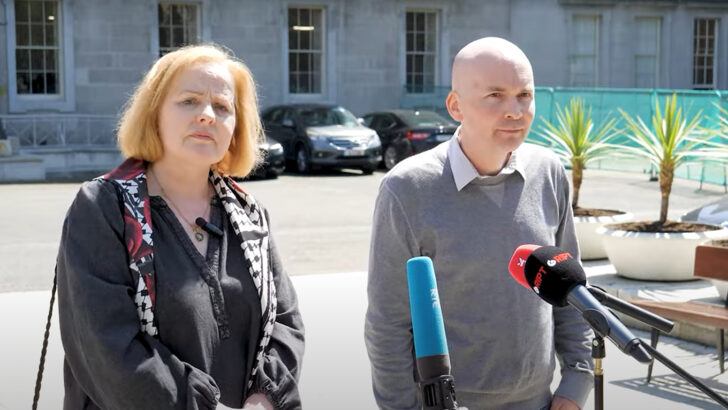Reams of paperless columns have already been written about our new Pope, Leo XIV, analysing every little look or utterance, every handshake, his dress, his repossession of the Papal Apartments. It seems to me that, among Catholics, there is a change in sentiment – a ‘vibe shift’, if you will – and a sense of excitement and hope at the prospect of change, or perhaps reversion, in the new papacy. Even Pope Leo’s decision to use the traditional papal “we” in his recent statements led one Catholic commentator on X, Prof. Edward Feser, to declare: “For once I’m delighted to hear someone announce his pronouns.”
Folklore
A story that I’m sure will go down in Pope Leo folklore is the video that surfaced during the week of one of the Pope’s brothers giving an interview to the Associated Press. During the conversation, the Pope’s brother said that he hadn’t yet had a chance to talk to the Pope since his election. However, when he checked the iPad on which his brother, the Pope, usually contacts him, he noticed he had missed two calls. He dialled the Pope’s number and, amazingly, the Pope answered – live on air. In an exchange to which everyone who has a sibling can relate, the Pope did not open with “Hello” or “Hi! How are you doing?”, but rather, “Why haven’t you answered my calls?”
His brother moved swiftly to warn him that he had been inundated with media requests all morning and that they were speaking live on air. There was a long pause at the Pope’s end, before he asked: “Right now?” It was television gold, but also an insight into the very normal relationship the brothers had with each other, not to mention the Pope’s sense of decorum in restraining himself in front of the eyes of the world. That same sense of decorum is evident in the Pope’s general demeanour and his very polite refusal to pose for selfies, saying that the multiple cameras that seem to follow him everywhere are sufficient to document whatever meeting is happening. My take is that – so far – the Pope has demonstrated masterfully how to be very much in the world, but not of the world.
Others say that people are increasingly tired of the LGBTQ+ agenda being pushed on everyone and everything”
Another vibe shift was evident in the United States recently with the announcement that the San Francisco Pride Parade has lost a number of major corporate sponsors. Organisers said that sponsors like Comcast, Anheuser-Busch and Diageo have pulled out of the high-profile parade. While some point to the influence that the new Trump administration is having on how corporate America is reacting, others say that people are increasingly tired of the LGBTQ+ agenda being pushed on everyone and everything. Issues like ‘trans-women’, i.e. biological men, being admitted to women’s sports and women’s bathrooms are causing many to reevaluate the whole LGBTQ+ project.
Legalised
Same-sex marriage was legalised in the United States in 2015 by judicial decision, the same year that it was legalised here by referendum. That period from 2015 until 2019, or up until Covid, marked peak ‘woke’ in society. Readers may recall at that time the frenzy to ‘cancel’ people over some utterance, old tweet or post that had been unearthed. In this country, those who were on the losing side of the 2015 marriage referendum or the 2018 abortion referendum felt they had to keep their heads down to protect their jobs or reputations. To this day, reminders of that time are evident on buses still painted in rainbow colours urging everyone to “get on board” with the LGBTQ+ project.
The media were in lockstep with the government and politicians generally, and for those who may have had a different opinion, the atmosphere was suffocating”
The atmosphere was tyrannically oppressive, not in the sense of tyrannies where one might fear for one’s life, but rather where one might fear for one’s livelihood if the wrong word was uttered. Then the Covid lockdown was imposed on the country and again fear reigned. The media were in lockstep with the government and politicians generally, and for those who may have had a different opinion, the atmosphere was suffocating.
But it seems that there must be something in the air, because we also witnessed a major vibe shift on the political/media home front in the last fortnight. Two weeks ago, Ruth Coppinger TD refused to take a question from reporter, Ben Scallan, of Gript Media. Gript, for those unfamiliar with the online publication, was founded in the wake of the 2018 abortion referendum as an alternative media voice. Ben Scallan has often been the only voice at Government press conferences asking difficult questions – so much so that Micheál Martin and Leo Varadkar once famously ignored him and his question at a press conference in front of a room filled with other journalists and simply walked away. Ruth Coppinger attempted to do the same thing outside the Dáil while taking journalists’ questions with her colleague, Paul Murphy, but this time something different happened.
Clip
In a clip on X [formerly Twitter] that has amassed 1.3 million views, Scallan asked Coppinger if she had any views on Minister Jim O’Callaghan’s proposal to speed up deportations for failed asylum speakers, to which she answered, “Not for Gript”. After a pause – while the reality of what she said sank in – Louise Burne from the Irish Daily Mirror challenged Coppinger, saying that it was unfair that she would not take Scallan’s questions. Burne remarked that he was a member of the Press Council, that there was press freedom in this country, and that he had a right to ask questions. Coppinger doubled down, refusing to engage, saying she did not think Scallan needed Burne to stand up for him. To Burne’s great credit, she said that if the roles were reversed, she hoped that someone would stand up for her.
Horgan-Jones also showed his disapproval of the TDs’ behaviour by saying, ‘If you guys aren’t willing to take questions, then maybe we won’t put them’”
Looking somewhat awkward, Paul Murphy, socialist TD and Coppinger’s colleague, turned to Irish Times journalist Jack Horgan-Jones and asked if he had a question (the Irish Times being an acceptable publication to the socialist TDs). Like Burne, Horgan-Jones also showed his disapproval of the TDs’ behaviour by saying, “If you guys aren’t willing to take questions, then maybe we won’t put them”. This may seem like a small thing, but in my opinion it is huge. Let me be clear, I do not think that Louise Burne or Jack Horgan-Jones were indicating that they were of the same views as Ben Scallan or share his political outlook, but it marked a refreshing return to the idea of fairness, of letting people speak and voice their questions, even if others disagree with their take on things. In a country in which asking awkward questions has been impossible over the past number of years, with media supressing alternative voices or views, this small thing gives me hope that maybe a change is afoot.


 Maria Steen
Maria Steen TDs Ruth Coppinger and Paul Murphy at a press conference. Photo: Gript
TDs Ruth Coppinger and Paul Murphy at a press conference. Photo: Gript